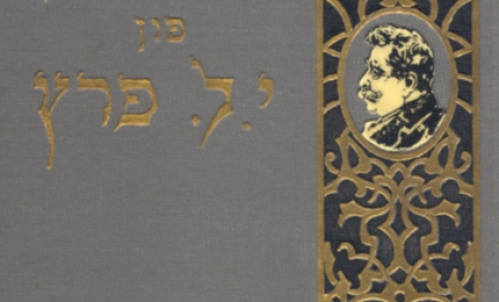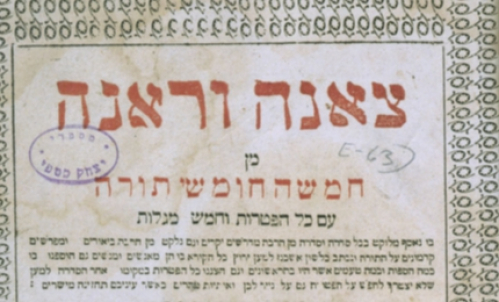Conference: The History & Future of the Strashun Library
Presentations and Panelists
Reclaiming the Jewish Past of Eastern Europe and
YIVO’s Digital Future

Jonathan Brent is the Executive Director of the YIVO Institute for Jewish Research in New York City. From 1991 to 2009 he was Editorial Director and Associate Director of Yale University Press. He is the founder of the world-acclaimed Annals of Communism series, which he established at Yale University Press in 1991. Brent is the co-author of Stalin’s Last Crime: The Plot Against the Jewish Doctors, 1948-1953 (Harper-Collins, 2003) and the author of Inside the Stalin Archives (Atlas Books, 2008). He is now working on a biography if the Soviet Jewish writer Isaac Babel. Brent teaches history and literature at Bard College.
Early and Rare Hebraica in the Strashun Library
The nearly 6,000 volumes assembled by Matisyahu Strashun in Vilna comprised one of the most important Jewish collections in Eastern Europe in the 19th century. Strashun's library held books printed over the course of 400 years, from early fruits of Hebrew typography in Italy to products of subsequent presses in Central and Eastern Europe, the Ottoman lands, and elsewhere. The oldest and rarest of these will be described, and the preservation of such incunabula and rara within Ashkenazic Yiddish civilization put in context.
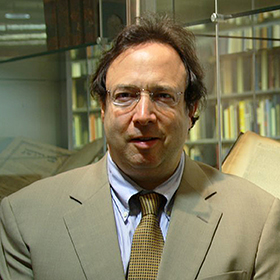
Brad Sabin Hill has held curatorial positions in Canada, Britain and the U.S., notably as Head of the Hebrew Section of the British Library, as Librarian and Fellow in Hebrew Bibliography at the Oxford Centre for Hebrew and Jewish Studies, and as Dean of the Library and Senior Research Librarian at the YIVO Institute. The author, co-author or editor of a number of books and articles in the field of Hebrew bibliography and booklore, including Incunabula, Hebraica & Judaica (Ottawa, 1981) and Treasures of the Valmadonna Trust Library (London, 2011), Hill has published studies on Hebrew typography and Hebrew libraries, as well as on Yiddish manuscripts and Yiddish bibliography. He has curated exhibitions in Ottawa, London, New York and Washington, among them displays of Renaissance Hebraica at the Pierpont Morgan Library and of Hebrew printing in the Orient at George Washington University. He lectures widely on book-historical subjects, most recently at the National Library of Canada, the John Rylands Library in Manchester (U.K.), and the Library of Congress.
What Did Jews Read in the Late Russian Empire?
Based on library circulation figures and print runs of publications, the paper will investigate reading practices among Jews in the Pale of Jewish Settlement at the turn of the twentieth century. The paper will address not only the specific types and titles of popular books, but also the modes of reading common among a variety of Russian Jews.

Jeffrey Veidlinger is Joseph Brodsky Collegiate Professor of History and Judaic Studies and Director of the Frankel Center for Judaic Studies at the University of Michigan. He is the author of the award-winning books The Moscow State Yiddish Theater: Jewish Culture on the Soviet Stage (2000), Jewish Public Culture in the Late Russian Empire (2009), and In the Shadow of the Shtetl: Small-Town Jewish Life in Soviet Ukraine (2013). He is the editor of Going to the People: Jews and Ethnographic Impulse (2016). Professor Veidlinger is a Vice-President of the Association for Jewish Studies, Associate Chair of the Academic Advisory Council of the Center for Jewish History, and a member of the Academic Committee of the United States Holocaust Memorial Museum. He is currently working on a book about the pogroms of the Russian Civil War.
"Strashun's bibliotek" as a Public Library for Vilna's Jews
The Strashun Library ("Strashun's bibliotek," as it was referred to in Yiddish) was renowned for its extensive collections of old and rare Hebraica, and was regarded with enormous pride by Vilna's Jews. Ensconced in its own building adjoining the Great Synagogue in the Vilna shulhoyf, the library was situated at the center of the community's religious life. The Strashun Library functioned under the aegis of Vilna's official kehile and as such was accessible to all. In addition, it belonged to a loose and unofficial network of "public libraries" serving the Jews of Vilna. This presentation will provide background on several of the Jewish libraries that operated alongside the Strashun Library in the Jerusalem of Lithuania: the library of the Hevrah mefitse haskalah [also known by its Russian initials OPE], the Children's Library of the Tsentraler bildungs-komitet [Central Education Committee], the collections of the Sh. An-ski Jewish Historical and Ethnographic Society, and the library and press archive of the YIVO Institute itself. Each of these libraries served distinctive (but often overlapping) constituencies within the diverse and rapidly evolving cultural matrix that characterized Jewish Vilna during the interwar decades.

Since 1999, Zachary M. Baker has served as the Reinhard Family Curator of Judaica and Hebraica Collections in the Stanford University Libraries. In addition, in 2010 he was appointed as the Stanford Libraries' Assistant University Librarian for Collection Development (Humanities and Social Sciences). Prior to that, from 1987 to 1999, he was Head Librarian of the YIVO Institute for Jewish Research. His first professional position as a librarian was also at YIVO, when from 1976 to 1981 he cataloged Yiddish books from the Vilna Collection (many of which once were part of the Strashun Library's collections). In addition, he worked as Head of the Yiddish Department and Technical Services at the Jewish Public Library of Montreal (1981-1987).
The Strashun Library in War Time, 1939-1941
The Strashun Library shared the fate of Vilna’s Jews during the Nazi occupation. The Germans destroyed a large part of its collection by sending it to “paper mills” which repulped the books. They deported many valuable volumes to the Nazi “Institute for Investigation of the Jewish Question” in Frankfurt. But a part of the collection survived in hiding places in Vilna, thanks to the efforts of a heroic group of ghetto inmates, with the help of righteous gentiles. After the war, YIVO in New York and survivors in Soviet Vilnius worked to retrieve and protect the surviving remnants.
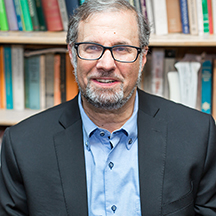
David E. Fishman is a professor of Jewish History at the Jewish Theological Seminary, teaching courses in modern Jewish history. Dr. Fishman also serves as director of Project Judaica, JTS's program in the Former Soviet Union (FSU), which is based at Russian State University for the Humanities (Moscow) and Kyiv-Mohyla Academy University (Kiev). Dr. Fishman travels frequently to Moscow and other parts of the FSU on behalf of Project Judaica. He directs its Jewish Archival Survey, which publishes guides to Jewish archival materials in the FSU. Recently he co-edited a guide to Jewish collections in the previously top-secret Special Archive in Moscow. Dr. Fishman also writes for the Jewish Daily Forward on Jews and the current situation in Russia and Ukraine. Dr. Fishman is the author of numerous books and articles on the history and culture of East European Jewry including Russia's First Modern Jews (New York University Press, 1996) and The Rise of Modern Yiddish Culture (University of Pittsburgh Press, 2005).
From "Likutei Shoshanim" to "the Paper Brigade":
The Strashun Library in Vilna
The paper will discuss the history, activities and treasures (manuscripts, incunabula and rare books) of the Strashun Private and Public Libraries in Vilna from the end of the 19th century until WWII. The presentation will also focus on the influence that the Strashun Library as the institution had on the cultural and spiritual life of the Jewish community in Vilna, which was known as “Yerushalayim d’lite” (Jerusalem of Lithuania).
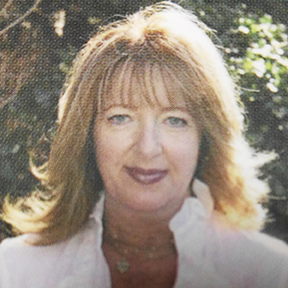
Frida Shor is the Library Director and a lecturer at Ariel University. In 2012, Shor published From “Likute Shoshanim” to “The Paper Brigade”: The Story of the Strashun Library in Vilna. Shor has also published articles in Przeglad Biblioteczny – Library Review, Social Security, The Journal of Academic Librarianship, and the Journal for Physiotherapy.
The Strashun Private Library Digitization Project
and the Edward Blank YIVO Vilna Collections Project
The Strashun Private Library Digitization Project, now in its second year of successful development, is an essential component of the Edward Blank YIVO Vilna Collections Project, a multi-year, international initiative to digitize archival and library collections in partnership with the Martynas Mažvydas National Library of Lithuania and Lithuanian Central State Archive. Project co-directors Lyudmila Sholokhova and Roberta Newman will discuss the concept, goals, progress, and challenges of both the Strashun project and the project as a whole.
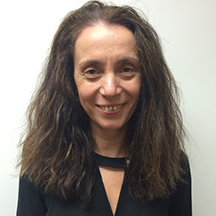
Dr. Lyudmila Sholokhova is the Director of the YIVO Institute Archives and Library. She was Head Librarian at from 2011-2016 and Acting Head Archivist from 2014-2016. From 1994 to 2001, she was a Research Associate at the Judaica Division of the Vernadsky National Library of Ukraine. Dr. Sholokhova is the author of numerous publications on the history of Jewish music and Jewish bibliography. She is fluent in Russian, Ukrainian, and Yiddish.
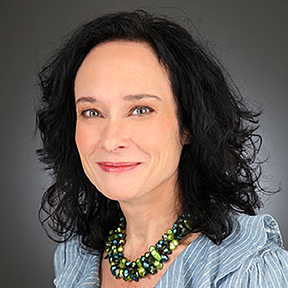
Roberta Newman is YIVO’s Director of Digital Initiatives. From 1988-1992, she was the curator of YIVO’s film and photo archives. She served as the Illustrations Editor and Director of Research for The YIVO Encyclopedia of Jews in Eastern Europe and is co-author, with Alice Nakhimovsky, of Dear Mendl, Dear Reyzl: Yiddish Letter Manuals from Russia and America, published by Indiana University Press in 2014, winner of a National Jewish Book award.
The Strashun library collections between the Soviet occupation of Lithuania and nowadays
The paper analyzes a group of less known 1940-1941 documents from Lithuanian archives pertaining to the management of the library by soviet authorities and the situation they left it on the eve of the Nazi invasion of Vilnius. Furthermore, the paper discusses the fate of the remnants of the library collections in Lithuania after the WWII, as well as their current status within the holdings of the National library of Lithuania and its research and conservation in which the Vilna project has been a pivotal turn.
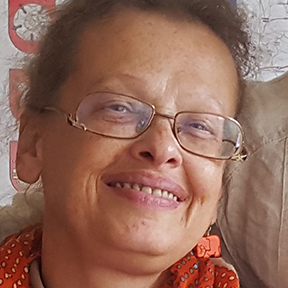
Dr. Lara Lempert (Lempertienė) is a researcher of Jewish book and manuscripts at the National Library of Lithuania and the acting director of its Judaica center. Her main field is the cultural history of the European Jewry, and the specific points of scholarly interests are Jewish classical texts and their integration in Jewish education in various settings; Jewish book and press; and aspects of day-to-day life of Lithuanian Jewry.
